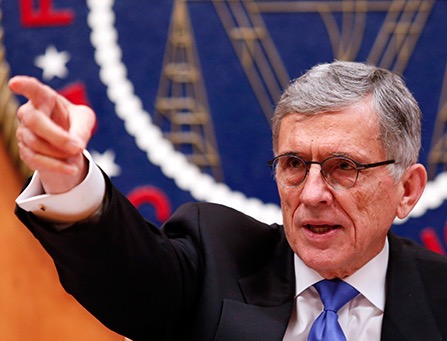Political Ad Disclosure Not on FCC’s Docket

The smarter way to stay on top of broadcasting and cable industry. Sign up below
You are now subscribed
Your newsletter sign-up was successful
Despite calls from congressional Democrats and campaign finance reformers, FCC chairman Tom Wheeler has not signaled an interest in looking into the extent of the commission’s authority to require more detailed disclosures of the funders of those PAC and SuperPAC ads filling station coffers.
Time is growing short to do anything about it before the 2016 elections, and Wheeler has indicated he is in no rush to wrestle with the issue.
“I am at a loss to understand the chairman’s evident disinterest in using existing statutory authority to address a significant issue which has such adverse effects on democratic self-governance,” said Andrew Schwartzman, a public interest attorney, who has been co-counsel to groups complaining about TV station on-air political ad disclosures.
Some have questioned why Wheeler wouldn’t just open an inquiry, which would signal to Democrats that he recognizes their concerns about the impact of money on politics while not committing himself to any action. Broadcasters are not looking for the FCC to get any deeper into their political advertising business.
All that said, there is no shot clock on an inquiry, which could even extend past Wheeler’s tenure.
Where the Action Is
The smarter way to stay on top of broadcasting and cable industry. Sign up below
There is precedent for simply opening a docket in response to Hill calls for action. For example, with some legislators clamoring for FCC action on retrans impasses under former FCC chairman Julius Genachowski, the Democrat launched an inquiry and even proposed getting rid of exclusivity rules. But after Genachowski collected comment, the docket lay dormant for years and outlived the chair’s tenure without any action.
A bill introduced last spring by Rep. John Yarmuth (D-Ky.) would direct the FCC to require the on-air sponsorship identifications on TV and radio political ads from PACs and nonprofits to better identify the actual funders of those ads. But it did not get past Republican committee leadership. (To read the full text of the bill, go to broacastingcable.com/Jan11.)
Democratic representatives Anna Eshoo (D-Calif.), ranking member of the Communications Subcommittee, and Frank Pallone (D-N.J.), ranking member of the full committee, are both backers of the bill. “Americans deserve to know who is using the public’s airwaves to influence political debates. Transparency should not stop at the doors of the FCC,” Pallone said at a Hill hearing after the bill got the cold shoulder from Republicans.
But with legislation a veritable long shot—earlier Democratic attempts to boost disclosure have met with the same fate—some Dems have pressed the FCC to use authority they argue it already has.
A Hill source said the pressure to act has come from both House and Senate Democrats, who also professed not to know why no action was forthcoming. The source said some Democratic members were befuddled by Wheeler’s seeming disinterest.
In 2010, the Supreme Court’s Citizens United decision lifted the ban on direct funding of electioneering communications by corporations and unions, saying it was a violation of speech rights. But it did preserve requirements to disclose those ad expenditures on-air.
The FCC has not found broadcasters to be in violation of that requirement in myriad challenges to how various broadcasters have disclosed funders for PAC ads, but campaign finance reformers argue the FCC needs to tighten its regulations and require the actual funders to fess up.
The FCC has proposed extending its TV station online political file requirement to radio stations and cable and satellite operators, which could boost transparency but would still avoid the issue of enhanced disclosures.
Cruz Control?
Before he was a trending presidential candidate, Sen. Ted Cruz (R-Texas) was still a powerful Senator who held up Wheeler’s confirmation to the top commission spot for several months. The issue, as one may recall, was enhanced disclosures post-Citizens United, and Cruz lifted the hold only after a meeting with Wheeler, during which Cruz said he got the assurances that it was not a Wheeler priority.
But Wheeler has not shied away from tackling issues that ruffle feathers on either side of the aisle in service of broadband and competition.
The chairman declined comment for this story, but he has recently signaled again that the FCC’s dance card is pretty full—retrans, auctions, net neutrality-related issue—and reiterated that enhanced disclosure is not on that list.
Contributing editor John Eggerton has been an editor and/or writer on media regulation, legislation and policy for over four decades, including covering the FCC, FTC, Congress, the major media trade associations, and the federal courts. In addition to Multichannel News and Broadcasting + Cable, his work has appeared in Radio World, TV Technology, TV Fax, This Week in Consumer Electronics, Variety and the Encyclopedia Britannica.

